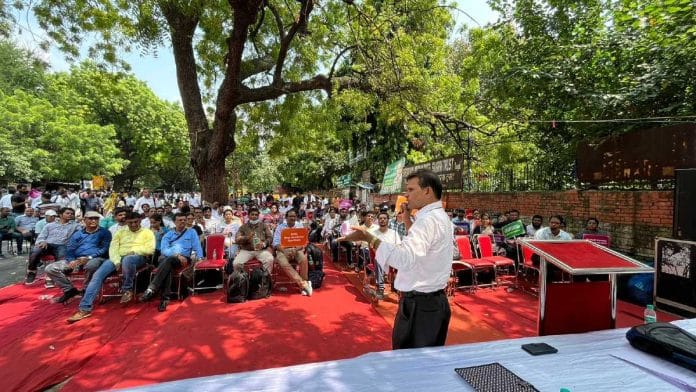New Delhi: Hundreds of non-MBBS teachers from across India have gathered at Jantar Mantar in Delhi since last week to protest against what they say are “prejudiced and biased” policies of the National Medical Commission (NMC), and to demand replacement of its undergraduate board.
The non-MBBS, or non-medical, teachers teach pre-clinical subjects (anatomy, biochemistry, physiology, microbiology and pharmacology) to MBBS students in the first and second years of their undergraduate course.
Their protest is against the NMC norms issued 16 August to continue with the reduced appointment ceiling for non-medical teachers that was first laid out in 2020.
This, said Sridhar Rao, former president of the National M.Sc Medical Teachers’ Association (NMMTA), was despite the Union health ministry writing twice to the Commission to allow recruitment of non-medical teachers according to the policy in practice before 2020.
In its notification titled ‘Minimum Requirements for Annual MBBS Admissions Regulations, 2020’, the medical education regulator had said that while in anatomy and physiology subjects, 15 percent non-medical teachers could be hired, there was no provision in pharmacology and microbiology subjects.
Earlier, up to 30 percent limit was allotted for them in these subjects.
For biochemistry, for which the ceiling was the highest at 50 percent, the limit was brought down to 15 percent in 2020.
ThePrint explains what the controversy is about and why nearly 3,000 non-medical teachers in medical colleges are up in arms against the NMC.
Also Read: NMC bars 38 medical colleges from admitting MBBS students this year over ‘administrative lapses’
Entry of non-medical teachers as faculty
Prior to 2020, up to 30 percent of faculty members in medical colleges, who taught various preclinical subjects to first and second-year students, did not have MBBS degrees.
The practice had continued for decades when there were not enough qualified teachers and the Medical Council of India (which was replaced by the NMC in 2019) later permitted MBBS candidates with a general MSc degree to be employed in medical colleges for non-clinical subjects.
Over a period of time, even non-MBBS candidates with a Master’s and Doctorate degrees in life sciences were recruited as faculty in the majority of medical colleges.
The NMC in 2020, however, said that it wanted to shift the curriculum towards competency-based learning for MBBS students through clinical exposure from the first-year itself, and thus non-MBBS candidates teaching the subjects would have to be eased out.
The NMMTA appealed to the health ministry against the proposal and also filed a writ petition in the Delhi High Court, which ordered the earlier recruitment policy to continue till the time a final verdict was given in the case.
In January 2022 and then in June, the ministry asked the Commission to reinstate the proportion of faculty members allowed for pre-clinical subjects as was the practice before 2020.
But the NMC, in its ‘Guidelines for Under Graduate Courses under Establishment of New Medical Institutions, Starting of New Medical Courses, Increase of Seats for Existing Courses & Assessment and Rating Regulations 2023’, issued on 16 August, has allegedly not accommodated either the ministry directive or the court order.
“This is a brazen and arbitrary move by the NMC, and we will not accept it,” Rao said.
The protesting teachers are also demanding that new members be brought on the NMC’s undergraduate board.
ThePrint tried reaching out over phone to Dr Aruna Vanikar, president of Undergraduate Medical Education Board of the NMC, with queries on the matter, but she was unavailable. This copy will be updated if and when a response is received.
A member of the All-India Pre and Para Clinical Medicos Association, a network of MBBS teachers teaching preclinical subjects, asserted the NMC move was “reformative”. “It has been our view that only those with a MBBS degree, apart from other pre-requisite qualifications, should be allowed in medical colleges,” the member told ThePrint.
‘Chronic scarcity of medically-qualified educators’
According to NMMTA members, teaching MBBS students requires a comprehensive understanding of the discipline, knowledge for which is obtained through postgraduate courses like medical M.Sc and MD.
“The training for both tracks is remarkably similar, rendering educators from both streams equally competent for teaching roles,” said NMMTA member Ayan Das.
NMMTA president Tukaram Prabhu pointed out that the presence of non-medical educators in medical education was not unique to India and was a globally accepted practice. In American medical institutions, for instance, only 8-11 percent of educators in preclinical subjects are medical professionals, while the rest are non-medical educators, he said.
He also pointed out that despite the noticeable increase in MD seats in non-clinical disciplines in the recent years, a significant percentage — 40 to 50 percent — remain unoccupied annually, primarily because MBBS graduates gravitate towards clinical specialties.
“This chronic scarcity of medically-qualified educators remains unresolved, and we, as non-medical educators, present a viable solution to this ongoing challenge,” he said.
Prabhu also stressed that medical M.Sc programmes are designed with curricula and syllabi analogous to MD courses in these subjects.
“These programmes often run concurrently within medical college departments, facilitated by the same professors employing identical resources and methodologies,” he said. “The pedagogical aspects, including clinical correlation, journal clubs, seminars, case discussions, dissertations, laboratory postings, and more, mirror each other closely. The examination process itself is comparable.”
“Degrees are conferred under the faculty of medicine by health universities. Beyond clinical practice, our training encompasses all the roles for which MD students are prepared,” the NMMTA president explained.
(Edited by Nida Fatima Siddiqui)
Also Read: ‘Our doctors should train here, not abroad’: Mandaviya urges pvt hospitals to start UG, PG courses






